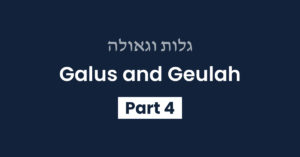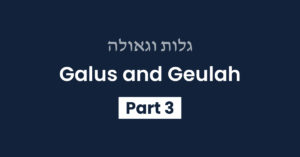We are about to enter the Nine Days, a time of intense mourning for the Beis Hamikdash. What does Hashem want us to be thinking about during this time?
To understand what Hashem wants us to be focusing on, we can consider how we got into Galus in the first place. Chazal1 reveal to us the answer: The second Beis HaMikdash was destroyed because of Sinas Chinam – ”baseless hatred” among Jews.
If so, why did Hashem put us in Galus? How does being in Galus teach us to have less Sinas Chinam?
The Root of Sinas Chinam: A “Taker” Mentality
Rav Dessler2 gives a very interesting answer: He explains that the root of Sinas Chinam is when a person has a “Taker” mentality… and being in Galus trains us to avoid becoming “Takers.”
Imagine that it’s a very hot day and you’re in the mood for some ice cream. You walk over to the freezer, but as you enter the kitchen, you see that your younger brother had the same idea… and he’s now eating the last drop of ice cream in the house!
“Hey!” you might think to yourself. “I wanted that ice cream! I can’t believe he ate the last drop! That was so unfair! So insensitive of him! Doesn’t he realize there are other people in this house who might want some ice cream too?” These thoughts can turn into Sinas Chinam, baseless hatred, that can stay simmering within you for a while.
A person who thinks this way has the mentality of a “Taker.” He is thinking only about himself and what he wants. I want ice cream, so I deserve to have the last drop. If someone else takes my ice cream, then I will be mad at him because he is ruining my life.
But this is not at all how Hashem wants us to think. Hashem created us b’tzelem Elokim – in the image of G-d. This means that every one of us has the capacity to emulate Hashem’s middos. Just as Hashem is the Ultimate Giver who loves to do Chessed, our job on this earth is to emulate Hashem by training ourselves to become givers, too.
Just as Hashem is the Ultimate Giver who loves to do Chessed, our job is to emulate Hashem by training ourselves to become givers, too.
When we act selfishly with the mentality of a taker, we are acting in opposition to the entire purpose of our creation. Yet this was how many of the Jews were acting during the times of the Second Beis Hamikdash, and this corrupted mentality is what ultimately led to the destruction of the Beis HaMikdash and our being thrown into exile.
Galus: Fixing the Skewed Perspective
So how does Galus solve the problem?
Rav Dessler explains that the experience of being in Galus helps transform us from “Takers” into “Givers.” We are more likely to fall into this “Taker” mentality when everything is going right in our lives and we feel entitled to everything that comes our way. The more we assume that we deserve the best and things will just continue to go well, the more we are annoyed if someone else throws us off the hook.
So Hashem placed us in exile (Galus) to shake us up – to disrupt our sense of stability and predictability. In this state of uncertainty, when we’re living away from our homeland, we become aware of our own vulnerability. We never know if we’re really safe and we never know when the next crisis or pandemic will strike.
When we’re faced with this unpredictability, we can no longer rely on our own perceived strength and abilities (“I can take care of myself – I don’t need anyone else!”). Rather, we are forced to realize that we depend on others for help, protection, and support.
This realization naturally shakes us out of our “Taker” mentality and prompts us to understand the importance of giving: Just as we rely on other people to support us and protect us, we, too, have a responsibility to give and help others.
Hashem put us in Galus to shake us out of our “Taker” mentality so that we’ll learn to become “Givers.“
Aside from being less focused on materialism, being in Galus can also help us feel more unified with our fellow Jews, which is another remedy for Sinas Chinam. When we see so many scary gentiles roaming the streets, who may be out to get us (chas veshalom!), we are so happy whenever we see a fellow Jew. Have you ever been walking alone in a scary area and then noticed a fellow Jew on the street? You felt so relieved and unified with him even though he is a complete stranger to you. Being in Galus helps us feel more unified with the rest of the Jewish people.
Fortunately, most of us live in areas where we don’t have to fear for our lives or be subject to extreme discomfort. This is a tremendous kindness from Hashem that He is allowing us to feel comfortable and safe even while we are in exile. But if we want Mashiach to come, it would be most appropriate to remember the messages of Galus, so that Hashem doesn’t have to chas veshalom do anything else to shock us into having the right priorities.
Let’s try this week to remember the message of Galus, and do our utmost to become “givers” and lovers of our fellow Jew. In this merit, may we all see the coming of Mashiach very speedily in our days, and not have to fast or mourn on Tisha B’Av next week!
Sources: [1] Yuma 9b; [2] Michtav Mei’Eliyahu, Vol. II. pg 109
Your Challenge
Once a day, give to another person.
Aside from giving something physical, you can also consider “giving” emotional or spiritual assistance in some way.
FOR EXAMPLE:
- Hold the door open for someone else.
- Bring someone a cup of tea or coffee, just the way they like it.
- Give someone a big smile or compliment.
- Express your appreciation to another person.
Torah Questions
- Who was the first person who ever had to endure the punishment of going into exile?
- In Vayikra 26:44, Hashem promised Bnei Yisroel that even when we are in exile, in the land of our enemies, He will not _______?
- In Yechezkel 11:16, Hashem says that even when we are in exile and scattered around the different lands, He will be a _____ for us.
- According to Pirkei Avos 5:9, which sins cause people to go into exile?
- According to the Gemara (Shabbos 118a-b), which mitzvah can save a person from being subject to “sheebud galiyos” (servitude in Galus)?
Questions to Ponder
- The Gemara (Yuma 9b) says that the first Beis HaMikdash was destroyed because the Jewish people were guilty of the sins of idol worship, murder, and illicit relationships. And the second Beis HaMikdash was destroyed because of Sinas Chinam. But in both cases, before Hashem destroyed the Beis HaMikdash, He sent many prophets to warn the Jewish people. Why do you think the Jewish people didn’t listen? How could they not heed the warnings of the prophets that the Beis HaMikdash would be destroyed if they would not improve?
- Chazal teach us that the Second Beis Hamikdash was destroyed due to the sin of Sinas Chinam – baseless hatred. What does it mean to have “baseless hatred”? If you hate somebody, doesn’t that mean that you have a reason for hating them? What could “baseless hatred” be referring to?
- The Gemara says that if a person forgets even one piece of Torah that he learned, it will chas veshalom cause his descendants to be exiled. Why do you think that forgetting a little bit of Torah is so serious that it can cause exile?
- The Gemara says that any community that includes people who are guilty of flattery, will ultimately be exiled. Why do you think exile is a fitting punishment for flatterers?





